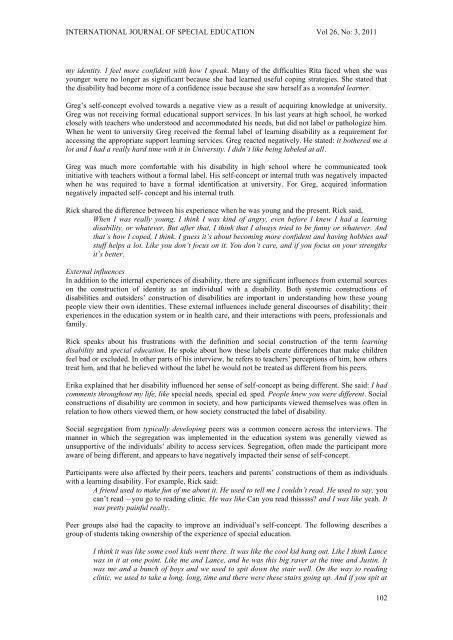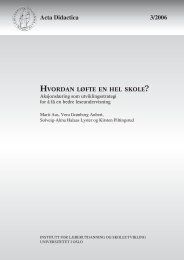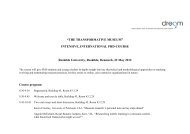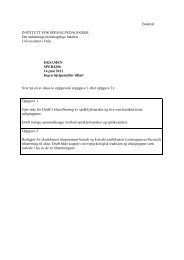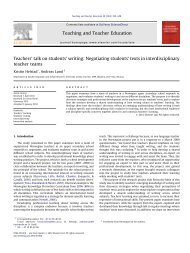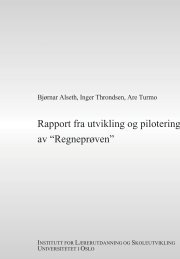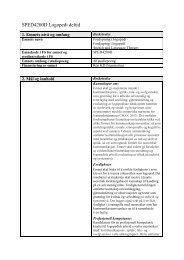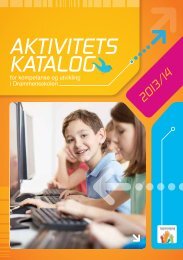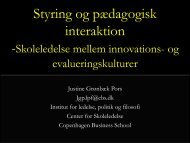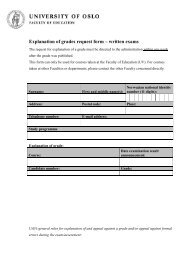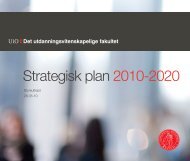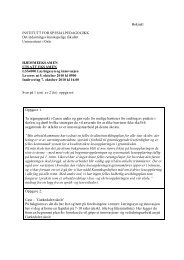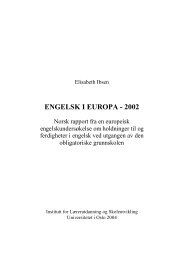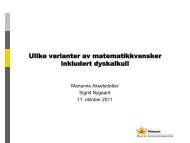International Journal Special Education
International Journal Special Education
International Journal Special Education
You also want an ePaper? Increase the reach of your titles
YUMPU automatically turns print PDFs into web optimized ePapers that Google loves.
INTERNATIONAL JOURNAL OF SPECIAL EDUCATION Vol 26, No: 3, 2011my identity. I feel more confident with how I speak. Many of the difficulties Rita faced when she wasyounger were no longer as significant because she had learned useful coping strategies. She stated thatthe disability had become more of a confidence issue because she saw herself as a wounded learner.Greg’s self-concept evolved towards a negative view as a result of acquiring knowledge at university.Greg was not receiving formal educational support services. In his last years at high school, he workedclosely with teachers who understood and accommodated his needs, but did not label or pathologize him.When he went to university Greg received the formal label of learning disability as a requirement foraccessing the appropriate support learning services. Greg reacted negatively. He stated: it bothered me alot and I had a really hard time with it in University. I didn’t like being labeled at all.Greg was much more comfortable with his disability in high school where he communicated tookinitiative with teachers without a formal label. His self-concept or internal truth was negatively impactedwhen he was required to have a formal identification at university. For Greg, acquired informationnegatively impacted self- concept and his internal truth.Rick shared the difference between his experience when he was young and the present. Rick said,When I was really young, I think I was kind of angry, even before I knew I had a learningdisability, or whatever. But after that, I think that I always tried to be funny or whatever. Andthat’s how I coped, I think. I guess it’s about becoming more confident and having hobbies andstuff helps a lot. Like you don’t focus on it. You don’t care, and if you focus on your strengthsit’s better.External influencesIn addition to the internal experiences of disability, there are significant influences from external sourceson the construction of identity as an individual with a disability. Both systemic constructions ofdisabilities and outsiders’ construction of disabilities are important in understanding how these youngpeople view their own identities. These external influences include general discourses of disability; theirexperiences in the education system or in health care, and their interactions with peers, professionals andfamily.Rick speaks about his frustrations with the definition and social construction of the term learningdisability and special education. He spoke about how these labels create differences that make childrenfeel bad or excluded. In other parts of his interview, he refers to teachers’ perceptions of him, how otherstreat him, and that he believed without the label he would not be treated as different from his peers.Erika explained that her disability influenced her sense of self-concept as being different. She said: I hadcomments throughout my life, like special needs, special ed, sped. People knew you were different. Socialconstructions of disability are common in society, and how participants viewed themselves was often inrelation to how others viewed them, or how society constructed the label of disability.Social segregation from typically developing peers was a common concern across the interviews. Themanner in which the segregation was implemented in the education system was generally viewed asunsupportive of the individuals’ ability to access services. Segregation, often made the participant moreaware of being different, and appears to have negatively impacted their sense of self-concept.Participants were also affected by their peers, teachers and parents’ constructions of them as individualswith a learning disability. For example, Rick said:A friend used to make fun of me about it. He used to tell me I couldn’t read. He used to say, youcan’t read – you go to reading clinic. He was like Can you read thisssss? and I was like yeah. Itwas pretty painful really.Peer groups also had the capacity to improve an individual’s self-concept. The following describes agroup of students taking ownership of the experience of special education.I think it was like some cool kids went there. It was like the cool kid hang out. Like I think Lancewas in it at one point. Like me and Lance, and he was this big raver at the time and Justin. Itwas me and a bunch of boys and we used to spit down the stair well. On the way to readingclinic, we used to take a long, long, time and there were these stairs going up. And if you spit at102


